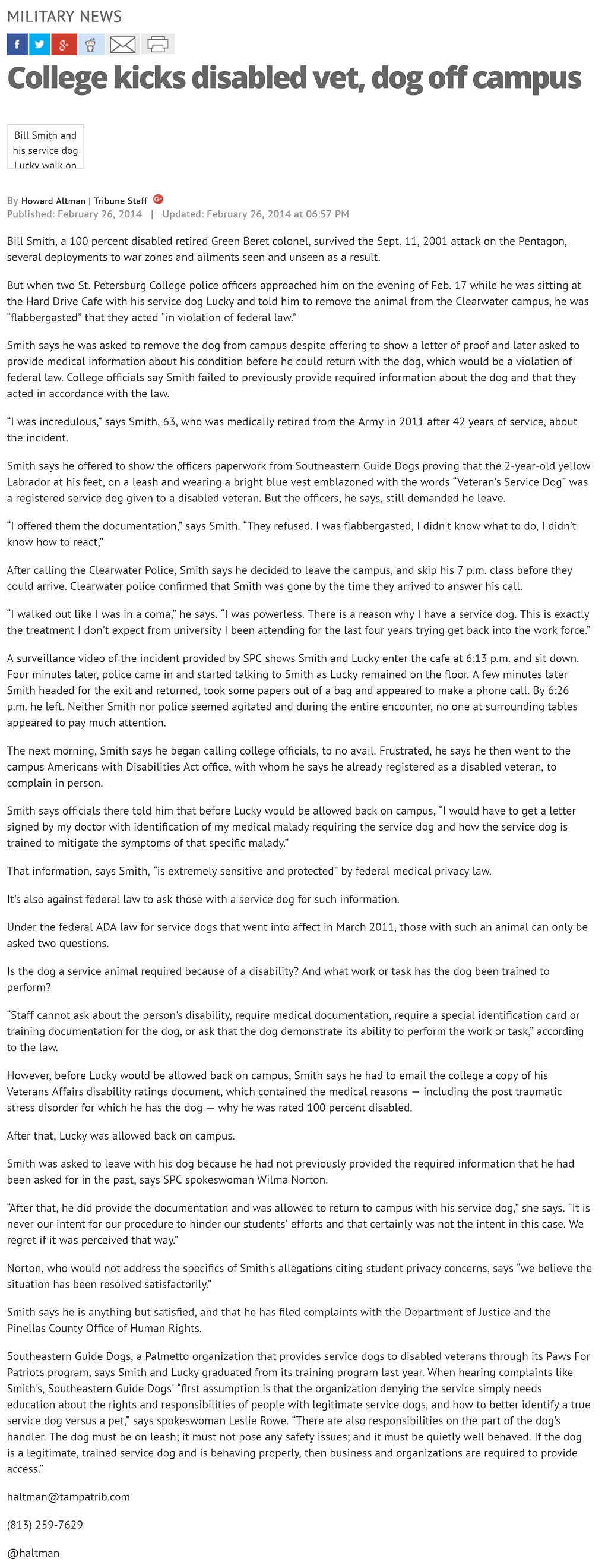
Bill Smith, a 100 percent disabled retired Green Beret colonel, survived the Sept. 11, 2001 attack on the Pentagon, several deployments to war zones and ailments seen and unseen as a result.
But when two St. Petersburg College police officers approached him on the evening of Feb. 17 while he was sitting at the Hard Drive Cafe with his service dog Lucky and told him to remove the animal from the Clearwater campus, he was “flabbergasted” that they acted “in violation of federal law.”
Smith says he was asked to remove the dog from campus despite offering to show a letter of proof and later asked to provide medical information about his condition before he could return with the dog, which would be a violation of federal law. College officials say Smith failed to previously provide required information about the dog and that they acted in accordance with the law.
“I was incredulous,” says Smith, 63, who was medically retired from the Army in 2011 after 42 years of service, about the incident.
Smith says he offered to show the officers paperwork from Southeastern Guide Dogs proving that the 2-year-old yellow Labrador at his feet, on a leash and wearing a bright blue vest emblazoned with the words “Veteran’s Service Dog” was a registered service dog given to a disabled veteran. But the officers, he says, still demanded he leave.
“I offered them the documentation,” says Smith. “They refused. I was flabbergasted, I didn’t know what to do, I didn’t know how to react,”
After calling the Clearwater Police, Smith says he decided to leave the campus, and skip his 7 p.m. class before they could arrive. Clearwater police confirmed that Smith was gone by the time they arrived to answer his call.
“I walked out like I was in a coma,” he says. “I was powerless. There is a reason why I have a service dog. This is exactly the treatment I don’t expect from university I been attending for the last four years trying get back into the work force.”
A surveillance video of the incident provided by SPC shows Smith and Lucky enter the cafe at 6:13 p.m. and sit down. Four minutes later, police came in and started talking to Smith as Lucky remained on the floor. A few minutes later Smith headed for the exit and returned, took some papers out of a bag and appeared to make a phone call. By 6:26 p.m. he left. Neither Smith nor police seemed agitated and during the entire encounter, no one at surrounding tables appeared to pay much attention.
The next morning, Smith says he began calling college officials, to no avail. Frustrated, he says he then went to the campus Americans with Disabilities Act office, with whom he says he already registered as a disabled veteran, to complain in person.
Smith says officials there told him that before Lucky would be allowed back on campus, “I would have to get a letter signed by my doctor with identification of my medical malady requiring the service dog and how the service dog is trained to mitigate the symptoms of that specific malady.”
That information, says Smith, “is extremely sensitive and protected” by federal medical privacy law.
It’s also against federal law to ask those with a service dog for such information.
Under the federal ADA law for service dogs that went into affect in March 2011, those with such an animal can only be asked two questions.
Is the dog a service animal required because of a disability? And what work or task has the dog been trained to perform?
“Staff cannot ask about the person’s disability, require medical documentation, require a special identification card or training documentation for the dog, or ask that the dog demonstrate its ability to perform the work or task,” according to the law.
However, before Lucky would be allowed back on campus, Smith says he had to email the college a copy of his Veterans Affairs disability ratings document, which contained the medical reasons — including the post traumatic stress disorder for which he has the dog — why he was rated 100 percent disabled.
After that, Lucky was allowed back on campus.
Smith was asked to leave with his dog because he had not previously provided the required information that he had been asked for in the past, says SPC spokeswoman Wilma Norton.
“After that, he did provide the documentation and was allowed to return to campus with his service dog,” she says. “It is never our intent for our procedure to hinder our students’ efforts and that certainly was not the intent in this case. We regret if it was perceived that way.”
Norton, who would not address the specifics of Smith’s allegations citing student privacy concerns, says “we believe the situation has been resolved satisfactorily.”
Smith says he is anything but satisfied, and that he has filed complaints with the Department of Justice and the Pinellas County Office of Human Rights.
Southeastern Guide Dogs, a Palmetto organization that provides service dogs to disabled veterans through its Paws For Patriots program, says Smith and Lucky graduated from its training program last year. When hearing complaints like Smith’s, Southeastern Guide Dogs’ “first assumption is that the organization denying the service simply needs education about the rights and responsibilities of people with legitimate service dogs, and how to better identify a true service dog versus a pet,” says spokeswoman Leslie Rowe. “There are also responsibilities on the part of the dog’s handler. The dog must be on leash; it must not pose any safety issues; and it must be quietly well behaved. If the dog is a legitimate, trained service dog and is behaving properly, then business and organizations are required to provide access.”
